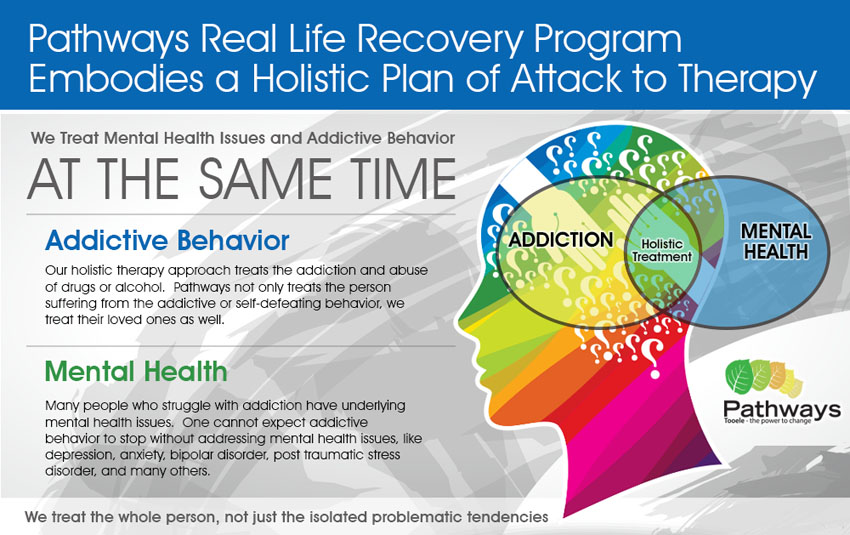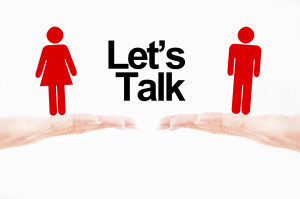What is a Dual Diagnosis?
Dual Diagnosis refers to a condition where one or more mental illnesses coexist with substance abuse. Many people with a dual diagnosis practice self-medication, where they use alcohol or drugs in an attempt to manage anxiety, depression, or other painful emotions. Some combine alcohol or illegal street drugs with prescription medication, dual diagnosis is a broad category with a very wide range, but the defining characteristic is that substance abuse and mental health disorders occur at the same time. Research indicates that working on addiction issues in conjunction with mental health disorders provides successful results.
Pathways Real Life Recovery understands how difficult it is suffering from mental illness and addiction. Our addiction and recovery professionals are here to help ease you or your loved one into a life of sobriety. Call us at 801-895-3006 or fill out our contact form to get started with a free addiction and mental-health assessment today.

Effects of Co-Occurring Disorders
Although Dual Diagnosis exists in all segments of society, studies have shown that men are more likely to suffer from this condition than women. It is also more prevalent in those with lower socioeconomic status, people with medical issues, and veterans of the armed forces. Approximately one-third of those with mental illnesses also participate in substance abuse, with that number increases to 50 percent among people with severe mental health issues. Those who have experienced traumatic life occupancies that they haven't dealt with through therapy may also be at higher risk. Left untreated, those suffering from Dual Diagnosis often meet with unhappy consequences, including homelessness, alienation from family, friends, and community, prison or jail time, loss of employment, divorce, loss of child custody, overdoses, and even untimely death.
Signs and Symptoms of Co-Occurring Disorders
Symptoms vary widely among those with a dual diagnosis, but some common characteristics are a withdrawal from family, friends, and social groups such as clubs, organizations, or community activities, an ability to obtain or keep gainful employment, and increasingly risky behavior such as driving when you're intoxicated or otherwise under the influence. Other signs might include feeling as if you cannot function in daily life without relying on the substance in question and doing things that are out of character for the purpose of feeding your habit. An example of this might be using money earmarked to put food on the family table or to pay a utility bill to purchase drugs or alcohol instead. You may also have difficulties developing and sustaining relationships, romantic or otherwise. If you feel that you may be experiencing Dual Diagnosis, please don't hesitate to contact the trained professionals at Pathways for a free evaluation.
Dual Diagnosis Treatment
Dual Diagnosis treatment provides patients with customized plans designed to address their unique issues. In the past, mental health and addiction disorders were treated separately, and programs were generally one-size-fits-all approaches that failed to take into consideration individual personalities, strengths, and weaknesses. Mental health practitioners of the past also commonly believed that it was necessary to treat addictive disorders prior to moving on to the psychiatric illness. The modern approach of treating the whole person has been found to produce better results. Modern treatment options include:
- Traditional Cognitive Behavioral Therapy
- Art & Music Therapy
- Individual Therapy
- Belief Restructuring
- Techniques for Reducing and Managing Anxiety and Depression
- Counseling for Trauma or Grief
- Detox Services
- Drug Addiction Treatment
- Alcohol Addiction Treatment
- Medication Management
- Hormone Level Testing
Our therapeutic team at Pathways works closely with each client to determine the best possible customized course of action to achieve ultimate healing. There is no standard treatment option that produces optimal results with every person with Dual Diagnosis because everyone has a complex relationship with his or her substance abuse and mental health issues. Our Utah-based team of mental health and addiction experts performs a complete and thorough evaluation of each individual who comes to us for help before crafting a program to maximize the benefits of psychiatric and substance abuse treatment.
Pathways Real Life Recovery is Utah’s Premier Co-Occurring Disorders Treatment Center
The high relapse rates of past approaches to addiction therapy are discouraging to many people -- and with good reason. Simply treating the addiction while ignoring the underlying mental health issue is almost a recipe for returning to substance abuse as a way to self-medicate. Our approach works because our first step is locating and identifying the root cause behind the addiction instead of treating only the symptoms. Our treatment team understands how and why psychiatric issues impact substance abuse, and we've seen for ourselves how effective treating the underlying issues along with the addiction actually is for those seeking an authentic recovery experience.
 We know how difficult it can be to make that first step, but you and your loved ones will be glad you did. Many people are reluctant to seek treatment because they have family or employment responsibilities that must be taken care of, but our intensive outpatient program allows you to maintain your obligations. We treat each client with dignity, respect, and love, helping them to break the cycle of shame and guilt associated with addiction and mental health disorders. We provide clients with the best possible chance of successful recovery from Dual Diagnosis using trusted treatment methods and ensuring that each person receives the support and high level of care necessary to make positive life changes.
We know how difficult it can be to make that first step, but you and your loved ones will be glad you did. Many people are reluctant to seek treatment because they have family or employment responsibilities that must be taken care of, but our intensive outpatient program allows you to maintain your obligations. We treat each client with dignity, respect, and love, helping them to break the cycle of shame and guilt associated with addiction and mental health disorders. We provide clients with the best possible chance of successful recovery from Dual Diagnosis using trusted treatment methods and ensuring that each person receives the support and high level of care necessary to make positive life changes.
Contact Pathways Today for Co-Occurring Disorders Treatment
Call Pathways Real Life Recovery and speak with a trained addiction expert; we are here to help you overcome co-occurring disorders with the best dual diagnosis treatment center for you or your loved one.
You can find a PDF of this page here.

